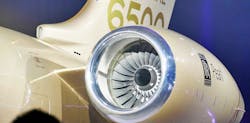Bombardier, Rolls-Royce Gain FAA Certifications
The Federal Aviation Administration has granted airworthiness certification to Bombardier Aviation's Global 5500 and Global 6500 business jets, as well as to the Rolls-Royce Pearl 15 turboshaft engine that powers those aircraft.
The Global 5500 and Global 6500 were developed from Bombardier’s earlier Global 5000 and Global 6000 business jets, with additional range and more efficient fuel-burn standards. The Global 5500 has a range of nearly 6,560 miles (e.g., nonstop from São Paulo, Brazil, to Paris, or Moscow to Los Angeles); and the Global 6500 has a range of about 7,595 miles (e.g., Hong Kong or Singapore to London.)
According to the developer, the two new jets "have the smoothest ride, the largest cabins and the longest range in their class."
FAA issues three types of certifications, for "type" (confirming aircraft and system design), "production", and "airworthiness." The Global 5500 and Global 6500 had been certified earlier by Transport Canada and the European Air Safety Administration (EASA.)
Bombardier also is developing "ultra" long-range business jets, the Global 7500 and Global 8000.
Bombardier has already completed the delivery of its first Global 6500 to a Hong Kong-based aircraft management company, HK Bellawings Jet Ltd.
“This latest milestone is terrific news and starts a new chapter in our Global family story,” according to Bombardier's senior vice president Michel Ouellette. “With the largest cabin in their respective classes, breakthrough design attributes and unique expressions of comfort, control, and the smoothest ride, the Global 5500 and Global 6500 aircraft have a strong future and will earn the appreciation of executives, pilots and operators around the world.”
Rolls-Royce developed the Pearl 15 engine specifically for the 5500 and 6500, to deliver up to 15,125 lbs. of thrust, with reduced engine noise and improved specific fuel consumption compared to the predecessor BR700 engine design.
The new engine also “deliver(s) world-leading emissions performance, including best in class NOx emissions, despite propelling customers at speeds approaching the speed of sound (Mach 0.90),” Rolls has stated.
